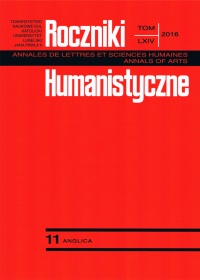Unaccusative or unergative: The case of the English verb to die
Abstrakt
Nieakuzatywny czy nieergatywny – analiza angielskiego czasownika TO DIE ‘umrzeć’
Celem niniejszego artykułu jest zbadanie, do jakiej klasy czasowników nieprzechodnich należy czasownik TO DIE ‘umrzeć’ w języku angielskim, który jest zaliczany do semantycznie spójnej grupy tzw. czasowników znikania (obok czasowników takich jak: disappear, expire, lapse, perish, vanish). Aby określić czy badany czasownik jest nieakuzatywny czy nieergatywny, został on poddany powszechnie uznanym testom na nieakuzatywność (Perlmutter 1978; Burzio 1986; Levin i Rappaport Hovav 1995). Na podstawie wyników sześciu przeprowadzonych testów diagnostycznych pokazane jest, że badany czasownik w języku angielskim nie spełnia większości kryteriów na nieakuzatywność, a raczej reprezentuje grupę czasowników o niejasnym statusie syntaktycznym. Może być on zatem przykładem tzw. Unaccusative Mismatch ‘Rozdźwięku w nieakuzatywności’ (Levin 1986), tj. zjawiska, w którym dwa lub więcej testów diagnostycznych potwierdzających nieakuzatywność nie jest spełnionych przez dany czasownik (por. Grimshaw 1987; Zaenen 1993; Levin and Rappaport Hovav 1995).
Bibliografia
Alexiadou, Artemis, Elena Anagnostopoulou, and Martin Everaert (eds.). 2004. The Unaccusativity Puzzle: Explorations of the Syntax-Lexicon Interface. Oxford, UK: Oxford University Press.
Al-Jubouri, I. M. N. 2010. Islamic Thought: From Mohammed to September 11, 2001. London: Xlibris Corporation.
Baker, James. 2013. “Diagnostics of unaccusativity in English and the Auxiliary Selection Hierarchy (unpublished draft).” Available at http://seven-fifty.net/2013_unaccusativity.pdf
Birner, Betty. 1994. “Information status and English inversion.” Language 70: 233–259.
Borgonovo, Claudia, and Sarah Cummins. 1998. “Predictable Participles.” Proceedings of the West Coast Conference on Formal Linguistics 17.
Bowerman, Melissa, and William Croft. 2008. “The acquisition of the English causative alternation.” Crosslinguistic Perspectives on Argument Structure: Implications for Learnability. Mahwah, edited by Melissa Bowerman, and Peneloppe Brown, 279–306. New Jersey: Erlbaum.
Braine, Martin D.S., and Patricia J. Brooks. 1995. “Verb argument structure and the problem of avoiding an overgeneral grammar.” In Beyond Names for Things: Young Children’s Acquisition of Verbs, edited by Michael Tomasello and William E. Merriman, 352–376. Hillsdale: Erlbaum.
Burzio, Luigi. 1986. Italian Syntax: a Government-Binding Approach. Dordrecht: Kluwer Academic Publishers.
Chomsky, Noam. 1981. Lectures on Government and Binding. Hawthorne, Westchester, New York: Foris Publications.
Chomsky, Noam. 1986. Knowledge of Language: Its Nature, Origin, and Use. New York: Praeger.
Chomsky, Noam. 1995. The Minimalist Program. Cambridge, MA: MIT Press.
Everaert, Martin. 1996. “The encoding of the lexical semantic structure of verbs: the case of the auxiliary selection in idioms.” In Lexical Structures and Languages Use, edited by Edda Weigand and Franz Hundsnurscher, 27–37. Tübingen: Max Niemeyer.
Google Books Corpus. Available at: http://googlebooks.byu.edu/x.asp
Grewendorf, Günther. 1989. Ergativity in German. Dordrecht: Foris.
Grimshaw, Jane. 1987. “Unaccusatives – an Overview.” In Proceedings of NELS 17, 1986, edited by Joyce McDonough and Bernadette Plunkett, 244–58. Vol. I. Amherst, MA: GLSA.
Grimshaw, Jane. 1990. Argument Structure. Cambridge, MA: MIT Press.
Hoekstra, Teun. 1984. Transitivity: Grammatical Relations in Government-Binding Theory. Dordrecht, Holland; Cinnaminson, N.J., U.S.A: Foris Publications.
Hoekstra, Teun. 1988. “Small clause result.” Lingua 74: 101–139.
Kitagawa, Yoshihisa. 1986. Subjects in Japanese and English. PhD Thesis. Massachusetts: Amherst.
Koopman, Hilda, and Dominique Sportiche. 1991. “The position of subjects.” Lingua 85 (2/3): 211–258.
Kuroda, Shige-Yuki. 1988. “Whether we agree or not: a comparative syntax of English and Japanese.” Lingvisticae Investigationes 12: 1–47.
Landau, Idan. 2003. “Unaccusatives, Resultatives, and the Richness of Lexical Representations.” Introduction to Syntax, MIT, Fall 2003.
Larson, Richard. 1988. “On the double object construction.” Linguistic Inquiry 19(3): 335–391.
Lee, Chang-Su. 1995. “Resultative and Depictive Constructions in English.” The Snu Journal of Education Research 1: 55–90.
Levin, Beth. 1993. Causative Alternation. English Verb Classes and Alternations. Chicago: University Press of Chicago.
Levin, Beth, and Malka Rappaport Hovav. 1995. Unaccusativity: At the Syntax-Lexical Semantic Interface. Cambridge, MA: MIT Press.
Levin, Beth, and Malka Rappaport Hovav. 2005. Argument Realization. Cambridge: Cambridge University Press.
Levin, Lori. 1986. Operations on Lexical Forms: Unaccusative Rules in Germanic Languages. Ph.D. Thesis. Cambridge, MA: MIT Press.
Mallory, James Patrick, and Douglas Q. Adams. 1997. Encyclopedia of Indo-European Culture. London: Fitzroy Dearborn Publishers.
Matushansky, Ora, Dooren van Annemarie, and Lotte Hendriks. 2012. “A path to the result(ative).” Paper presented at the Rencontres d’Automne de Linguistique Formelle, November 29–30, 2012.
Online World Heritage Encyclopedia. Available at http://www.hawaiilibrary.net/article/whebn0001895040/unaccusative%20verb
Perlmutter, David M. 1978. “Impersonal Passives and the Unaccusative Hypothesis.” Proceedings of the 4th Annual Meeting of the Berkeley Linguistics Society 4: 157–190.
Pesetsky, David. 1982. “Complementizer-Trace Phenomena and the Nominative Island Condition.” The Linguistic Review 1: 297–343.
Rappaport Hovav, Malka, and Beth Levin. 2001. “An event structure account for English resultatives.” Language 77: 766–797.
Rosen, Carol. 1984. “The interface between semantic roles and initial grammatical relations.” In: Studies in Relational Grammar 2, edited by David Perlmutter and Carol Rosen, 38–77. Chicago: University of Chicago Press.
Schäfer, Florian. 2009. “The causative alternation.” Language and Linguistics Compass 3.2: 641–681.
Shardl, Anisa (2010) “Variable Unaccusativity and Verb Classes.” Available at http://people.umass.edu/aschardl/variable-unaccusativity.pdf (accessed 9.05.2015).
Simpson, Jane. 1983. “Resultatives.” In Papers in Lexical-functional Grammar edited by Lori Levin, Malka Rappaport, and Annie Zaenen, 143–157. Bloomington: Indiana University Linguistics Club.
Sorace, Antonella. 2000. “Gradients in auxiliary selection with intransitive verbs.” Language 76 (4): 850–890.
The Dublin Review, XLII. 1857. London: Thomas Richardson and Son. Available at: https://books.google.pl/books?id=fvgEAAAAQAAJ&pg=PA387&dq=%22was+died%22&hl=pl&sa=X&ei=cBZmVZaLG8ScsAGXvYNI&ved=0CO4BEOgBMBs#v=onepage&q=%22was%20died%22&f=false
Van Valin, Robert D. 1990. “Semantic parameters of split intransitivity.” Language 66(2): 221–260.
Williams, Edwin. 1981. “Argument Structure and Morphology.” The Linguistic Review 1: 81–114.
Williams, Edwin. 1983. “Against small clauses.” Linguistic Inquiry 14: 287–308.
Zaenen, Annie. 1993. “Unaccusative Verbs in Dutch: An Integrated Approach.” In Semantics and the Lexicon, edited by James Pustejovsky, 129–161. Dordrecht: Kluwer Academic Publishers.
Copyright (c) 2016 Roczniki Humanistyczne

Utwór dostępny jest na licencji Creative Commons Uznanie autorstwa – Użycie niekomercyjne – Bez utworów zależnych 4.0 Międzynarodowe.





